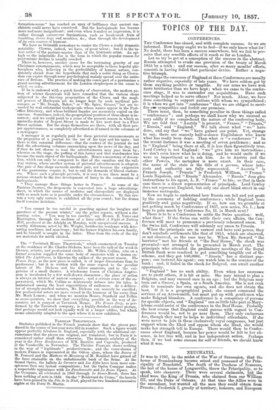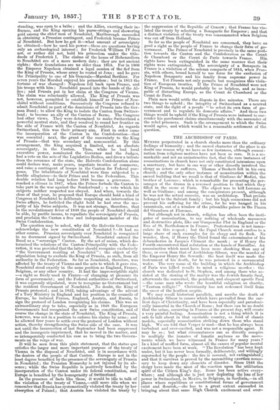NEUCHATEL.
IT was in 1707, in the midst of the War of Succession, that the house of Brandenburg became seised and possessed of the Principality of Neuchatel. The death of the -Duchess of Nemours, the last of the house of Longueville, threw the Principality, so to speak, into chancery. There were several claimants, but the chief were the King of Prussia, who claimed from our William DI, and the Duke of Orleans. At that time the Allies were in the ascendant, but wanted all the men they could obtain from Prussia; Frederick I, greedy of territory, honours, and European standing, was open to a bribe ; and the Allies, exerting their influence, and the King opening his purse-strings and showering gold among the chief men of Neuchatel, Marlborough succeeded in obtaining a Prussian contingent, and Frederick became Prince of Neuchatel. But how he got it—what amount of sovereignty he obtained—how he used his power—these are questions having only an archaeological interest ; for Frederick William IV does not, or rather did not, hold his princedom under the titledeeds of Frederick L The claims of the house of Hohenzollern to Neuchatel are of a more modern date ; they are not ancient rights ; their foundations are no older than 1815. For in 1806 the Emperor Napoleon obtained a legal cession of the fief from the King of Prussia, whose army he routed at Jena ; and. he gave the Principality to one of his G. enerals—Marshal Berthier. For seven years the Marshal enjoyed his princedom ; but in 1813 the fortune of war changed: Napoleon fell back upon France, and his troops with him ; Neuohatel passed into the hands of the Allies ; and Prussia put in her claim at the Congress of Vienna. The claim was reluctantly allowed. The King of Prussia was not, however, permitted to establish himself as Prince of Neuchatel without conditions. Successively the Congress refused to admit Neuchatel as part of the dominions of Prussia into the German Bund ; to allow the King to isolate the Canton from Switzerland ; to become an ally of the Canton of Berne. The Congress had other views. They were determined to make Switzerland a powerful neutral state, and they resolved to round her frontier on the side of France with the Canton of Neuchatel. As regards Switzerland, this was their primary. aim. First in order came the incorporation of the Canton in the Confederation—that was essential ; next, the grant of the suzerainty to the King of Prussia—that was secondary and nonessential. By this arrangement, the King acquired a limited, not an absolute sovereignty, in the Canton. Thus, while he had local executive power, nominated the Governor and the Judges, had a veto on the acts of the Legislative Bodies, and drew a tribute from the revenues of the state, the Helvetic Confederation alone could, declare war, make peace, negotiate treaties of commerce, and raise a contingent of troops in the Canton for Federal purposes. The inhabitants of Neuchatel were thus subjected to a double allegiance—to their Prince and to the Federation. This double relation had long before 1848 become a grievance. It reached a climax in 1847, when the Prince forbade the Canton to take part in the war against the Sonderbund ; a veto which his subjects neither respected nor obeyed. And when, towards the elose of that year, he proposed that Europe should hold a kind of Congress at Neuchatel to deliberate respecting an intervention in Swiss affairs, he forfeited the slight hold. he had over the majority of his Swiss subjects. It was not strange, therefore, that in the revolutionary fever of 1848 the people of Neuchatel should be able, by pacific means, to repudiate the sovereignty of Prussia, and proclaim the Canton a free and independent member of the swiss Confederation.
• The question may be asked, why did the Helvetic Government acknowledge the new constitution of Neuchatel f—Tt had no other course. Prussian sovereignty over Neuchatel is recognized in no document signed by Switzerland. Neuchatel entered the Bund as a "sovereign" Canton. By the act of union, which determined the relations of the Canton-Principality with the Federation, it was provided that the latter should recognize exclusively "the Government residing at Neuchatel"; the object of the stipulation being to exclude the King of Prussia, as such, from all authority in the Federation. So far as Neuchatel, therefore, was affected by the treaty of Vienna and the acts to which it gave rise, Neuchatel stood exactly in the same position as England, France, Belgium, or any other country. It had the impreseriptible right —a right so freely used in France—of changing at pleasure its form of government; and the Federal authorities of Switzerland, it was expressly stipulated, were to recognize no Government but the resident Government of Neuchatel. No doubt, the King of Prussia protested ; and in 1852, taking advantage of the advent of a Tory Ministry in England and his position in the councils of Europe, he induced France, England, Austria, and Russia, to sign the protocol of London recognizing his claims. This was an extraordinary step to take, especially as in 1848 the European Governments had recognized the new Swiss constitution, and of course the change in the state of Neuchatel. The King of Prussia, however, was not in a position to enforce his claims by arms ; and he allowed four years to settle over the protocol of London without action, thereby strengthening the Swiss side of the case. It was not until the insurrection of last September had been suppressed and the insurgents imprisoned, that he moved in the matter, and so intemperately conducted his case as to bring the two Governments on the verge of war.
It will be seen from this plain statement, that the status quo satisfies the larger and more important purpose of the treaty of Vienna in the disposal of Neuchatel, and is in accordance with the desires of the people of that Canton. Europe is not in the least degree benefited by the presence of the sovereignty of Prussia in Neu&atel ; the Prussian Monarchy is not injured by its absence; while the Swiss Republic is positively benefited by the incorporation of the Canton under its federal constitution, and Europe is benefited by the homogeneity of Switzerland.
In the presence of facts like these, it would be idle to talk of the violation of the treaty of Vienna,—still more idle when we remember that Russia has systematically violated the treaty by her absorption of Poland; that Austria has violated the treaty by the suppression of the Republic of CracoW ; that France has violated the treaty by selecting a Bonaparte for Emperor ; and, that a distinct violation of the treaty was consummated when Belgium was cut off from Holland.
So far as the people of Neuchatel are concerned, they have as good a right as the people of France to change their form of government. The Prince of Neuchatel is precisely in the same position towards the Canton and the Confederation as the Count de Chambord or the Count de Paris towards France. His, rights have been extinguished in the same manner that theirrights were extinguished. The sovereignty of a Bonaparte ira France is a violation of the solemn compacts of 1815, when Prussia, with others, bound herself to use force for the exclusion of Napoleon Bonaparte and his family from supreme power in France. Yet Prussia not only permits but recognizes this violation of European treaties. If the Prince of Neuchatel were not King of Prussia, he would probably be as helpless, and as incapable of disturbing Europe, as the Count de Chambord or the Count de Paris.
Plain men would settle the dispute in five minutes. There are two things to uphold ; the integrity of Switzerland as a neutral state, and the right of a people " to select its own form of government and to regulate its domestic affairs." And these two things would be upheld if the King of Prussia were induced to surrender his parchment claims simultaneously with the surrender of the rebel prisoners. Such is the arrangement to which the Swisa would agree, and which would be a reasonable settlement of the question.





























 Previous page
Previous page